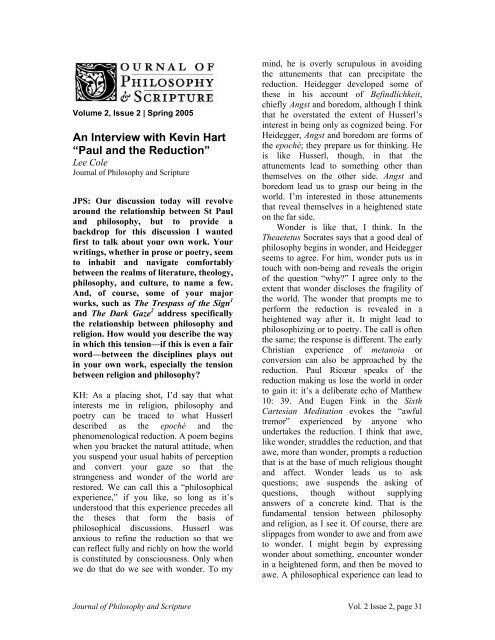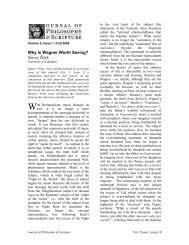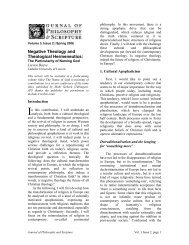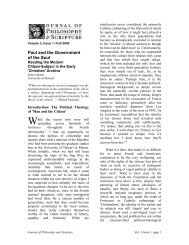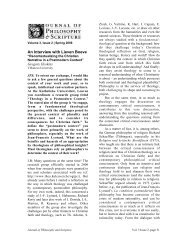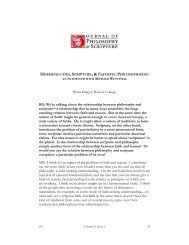An Interview with Kevin Hart - Journal of Philosophy and Scripture
An Interview with Kevin Hart - Journal of Philosophy and Scripture
An Interview with Kevin Hart - Journal of Philosophy and Scripture
Create successful ePaper yourself
Turn your PDF publications into a flip-book with our unique Google optimized e-Paper software.
Volume 2, Issue 2 | Spring 2005<br />
<strong>An</strong> <strong>Interview</strong> <strong>with</strong> <strong>Kevin</strong> <strong>Hart</strong><br />
“Paul <strong>and</strong> the Reduction”<br />
Lee Cole<br />
<strong>Journal</strong> <strong>of</strong> <strong>Philosophy</strong> <strong>and</strong> <strong>Scripture</strong><br />
JPS: Our discussion today will revolve<br />
around the relationship between St Paul<br />
<strong>and</strong> philosophy, but to provide a<br />
backdrop for this discussion I wanted<br />
first to talk about your own work. Your<br />
writings, whether in prose or poetry, seem<br />
to inhabit <strong>and</strong> navigate comfortably<br />
between the realms <strong>of</strong> literature, theology,<br />
philosophy, <strong>and</strong> culture, to name a few.<br />
<strong>An</strong>d, <strong>of</strong> course, some <strong>of</strong> your major<br />
works, such as The Trespass <strong>of</strong> the Sign 1<br />
<strong>and</strong> The Dark Gaze 2 address specifically<br />
the relationship between philosophy <strong>and</strong><br />
religion. How would you describe the way<br />
in which this tension—if this is even a fair<br />
word—between the disciplines plays out<br />
in your own work, especially the tension<br />
between religion <strong>and</strong> philosophy?<br />
KH: As a placing shot, I’d say that what<br />
interests me in religion, philosophy <strong>and</strong><br />
poetry can be traced to what Husserl<br />
described as the epoché <strong>and</strong> the<br />
phenomenological reduction. A poem begins<br />
when you bracket the natural attitude, when<br />
you suspend your usual habits <strong>of</strong> perception<br />
<strong>and</strong> convert your gaze so that the<br />
strangeness <strong>and</strong> wonder <strong>of</strong> the world are<br />
restored. We can call this a “philosophical<br />
experience,” if you like, so long as it’s<br />
understood that this experience precedes all<br />
the theses that form the basis <strong>of</strong><br />
philosophical discussions. Husserl was<br />
anxious to refine the reduction so that we<br />
can reflect fully <strong>and</strong> richly on how the world<br />
is constituted by consciousness. Only when<br />
we do that do we see <strong>with</strong> wonder. To my<br />
mind, he is overly scrupulous in avoiding<br />
the attunements that can precipitate the<br />
reduction. Heidegger developed some <strong>of</strong><br />
these in his account <strong>of</strong> Befindlichkeit,<br />
chiefly <strong>An</strong>gst <strong>and</strong> boredom, although I think<br />
that he overstated the extent <strong>of</strong> Husserl’s<br />
interest in being only as cognized being. For<br />
Heidegger, <strong>An</strong>gst <strong>and</strong> boredom are forms <strong>of</strong><br />
the epoché; they prepare us for thinking. He<br />
is like Husserl, though, in that the<br />
attunements lead to something other than<br />
themselves on the other side. <strong>An</strong>gst <strong>and</strong><br />
boredom lead us to grasp our being in the<br />
world. I’m interested in those attunements<br />
that reveal themselves in a heightened state<br />
on the far side.<br />
Wonder is like that, I think. In the<br />
Theaetetus Socrates says that a good deal <strong>of</strong><br />
philosophy begins in wonder, <strong>and</strong> Heidegger<br />
seems to agree. For him, wonder puts us in<br />
touch <strong>with</strong> non-being <strong>and</strong> reveals the origin<br />
<strong>of</strong> the question “why?” I agree only to the<br />
extent that wonder discloses the fragility <strong>of</strong><br />
the world. The wonder that prompts me to<br />
perform the reduction is revealed in a<br />
heightened way after it. It might lead to<br />
philosophizing or to poetry. The call is <strong>of</strong>ten<br />
the same; the response is different. The early<br />
Christian experience <strong>of</strong> metanoia or<br />
conversion can also be approached by the<br />
reduction. Paul Ricœur speaks <strong>of</strong> the<br />
reduction making us lose the world in order<br />
to gain it: it’s a deliberate echo <strong>of</strong> Matthew<br />
10: 39. <strong>An</strong>d Eugen Fink in the Sixth<br />
Cartesian Meditation evokes the “awful<br />
tremor” experienced by anyone who<br />
undertakes the reduction. I think that awe,<br />
like wonder, straddles the reduction, <strong>and</strong> that<br />
awe, more than wonder, prompts a reduction<br />
that is at the base <strong>of</strong> much religious thought<br />
<strong>and</strong> affect. Wonder leads us to ask<br />
questions; awe suspends the asking <strong>of</strong><br />
questions, though <strong>with</strong>out supplying<br />
answers <strong>of</strong> a concrete kind. That is the<br />
fundamental tension between philosophy<br />
<strong>and</strong> religion, as I see it. Of course, there are<br />
slippages from wonder to awe <strong>and</strong> from awe<br />
to wonder. I might begin by expressing<br />
wonder about something, encounter wonder<br />
in a heightened form, <strong>and</strong> then be moved to<br />
awe. A philosophical experience can lead to<br />
<strong>Journal</strong> <strong>of</strong> <strong>Philosophy</strong> <strong>and</strong> <strong>Scripture</strong> Vol. 2 Issue 2, page 31
<strong>Kevin</strong> <strong>Hart</strong><br />
Paul <strong>and</strong> the Reduction<br />
religious experience. Or I might step back<br />
from an experience <strong>of</strong> awe <strong>and</strong> wonder<br />
about it. If I do so <strong>with</strong> guided by scripture<br />
<strong>and</strong> prayer, I will set out on a path called<br />
“theology.” If I do not, I follow that other<br />
path, “philosophy.”<br />
JPS: The philosophical <strong>and</strong> the religious<br />
are not heterogeneous, then?<br />
KH: One can sometimes pass from the one<br />
to the other before any theses are posited;<br />
thereafter, disciplinary moves come into<br />
play for most people <strong>and</strong> you do philosophy<br />
or theology. Highly creative theologians <strong>and</strong><br />
philosophers are never fettered in that way,<br />
though. I don’t buy Heidegger’s insistence<br />
on “methodological atheism,” which is a<br />
dogmatic claim to the extent that it rules out<br />
<strong>of</strong> court the phenomenality <strong>of</strong> revelation.<br />
Husserl spoke <strong>of</strong> the need to be <strong>with</strong>out<br />
presuppositions when doing philosophy.<br />
That means receiving phenomena <strong>with</strong>out<br />
any conditions. Can this be done? One can<br />
certainly try very hard to put aside the<br />
natural attitude <strong>and</strong> what I call the<br />
supernatural attitude, the habit <strong>of</strong> regarding<br />
God in terms <strong>of</strong> positive <strong>and</strong> negative theses.<br />
Marion has rightly drawn our attention to<br />
invisible, paradoxical phenomena that<br />
impose on us, <strong>and</strong> if we agree <strong>with</strong> him we<br />
have no right to limit in advance what<br />
counts as phenomena. Belief in God does<br />
not simply give answers, as Husserl <strong>and</strong><br />
Heidegger thought; it re-orients questions<br />
<strong>and</strong> makes them all the more difficult. If I<br />
say, “God is love” I am not answering a<br />
question about the ultimate nature <strong>of</strong> reality.<br />
Long before that could ever be the case, I<br />
am posing a question: what does “love”<br />
mean here? We have no concept or set <strong>of</strong><br />
concepts to deal <strong>with</strong> that word in the<br />
context <strong>of</strong> “God is love.” A conversion to<br />
Christ is the reception <strong>of</strong> God giving<br />
Himself to you in Christ <strong>with</strong>out any<br />
conditions imposed by the one who comes<br />
to belief. I can receive unconditional love<br />
only if I set no conditions on receiving it.<br />
What I say <strong>of</strong> conversion is also true <strong>of</strong><br />
prayer. Each prayer is a re-orientation to<br />
God in Christ, a reductio in mysterium. To<br />
be converted is something that is always<br />
ahead <strong>of</strong> us as well as behind us.<br />
JPS: The figure <strong>of</strong> Saint Paul provides a<br />
point <strong>of</strong> departure for debates about the<br />
proper relationship between religion <strong>and</strong><br />
philosophy. Typically, Paul is perceived<br />
as a sort <strong>of</strong> “anti-philosopher,” <strong>and</strong> in<br />
The Trespass <strong>of</strong> the Sign you classify Paul<br />
as one <strong>of</strong> those figures who claim to be<br />
non-metaphysical “but which nonetheless<br />
find themselves entangled in<br />
metaphysics.” Should we see Paul as an<br />
“anti-philosopher” or at least someone<br />
who failed to recognize his implicit<br />
reliance on philosophy, or is this<br />
conception <strong>of</strong> Paul a mistake? Or, is it<br />
safer to say that there are “many Pauls”<br />
ins<strong>of</strong>ar as Paul’s message seems to shift<br />
depending on his audience?<br />
KH: I think there are several threads here. I<br />
don’t see Paul as philosophical in the way<br />
that John is. Paul’s background is<br />
pr<strong>of</strong>oundly marked by Pharisaism, <strong>and</strong><br />
unless we underst<strong>and</strong> that we will never<br />
come to grasp what he tells us about<br />
monotheism or election. Unless we<br />
recognize Paul as a Jew we will never grasp<br />
the force <strong>with</strong> which he replaces Torah <strong>with</strong><br />
Christ. But, as I say, he is different from<br />
John. His Christology has to do <strong>with</strong><br />
refiguring Adam <strong>and</strong> Wisdom, <strong>with</strong> a vision<br />
<strong>of</strong> Lordship <strong>and</strong> Messiahship, not <strong>with</strong> the<br />
pre-existent Logos. Its roots are in Isaiah’s<br />
<strong>and</strong> Ezekiel’s teaching <strong>of</strong> the new heart, not<br />
in Plato <strong>and</strong> Aristotle’s reflections on the<br />
Good. When he calls himself a “debtor both<br />
to the Greeks, <strong>and</strong> to the Barbarians” in<br />
Romans, he is talking <strong>of</strong> his scope <strong>of</strong> his<br />
preaching, not his intellectual inheritance.<br />
Rabbinic Judaism <strong>of</strong> the sort in which<br />
Paul was trained is plainly not metaphysical<br />
in the sense that it concerns thinking <strong>of</strong><br />
being as being, let alone in Heidegger’s<br />
sense <strong>of</strong> the word: there’s nothing there to<br />
make one think <strong>of</strong> <strong>An</strong>wesenheit or<br />
Vorh<strong>and</strong>enheit. <strong>An</strong>d it can only be called<br />
philosophical if one stretches the word quite<br />
far, taking it to mean the seeking <strong>of</strong> truth<br />
through argument. Rabbinic argumentation<br />
<strong>Journal</strong> <strong>of</strong> <strong>Philosophy</strong> <strong>and</strong> <strong>Scripture</strong> Vol. 2 Issue 2, page 32
<strong>Kevin</strong> <strong>Hart</strong><br />
Paul <strong>and</strong> the Reduction<br />
is more akin to the Gentile sense <strong>of</strong> law than<br />
to the Greek sense <strong>of</strong> philosophy. So if Paul<br />
is an anti-philosopher he is so in a different<br />
way than les philosophes were or the<br />
positivists were. He sets himself against<br />
both Jewish talk <strong>of</strong> signs <strong>and</strong> Greek talk <strong>of</strong><br />
wisdom, <strong>and</strong> it is the latter that lets us see<br />
him as an anti-philosopher. Think <strong>of</strong> the<br />
opening <strong>of</strong> the first letter to the Corinthians.<br />
The Cross, he says there, is “foolishness,”<br />
<strong>and</strong> he quotes Isaiah, “I will destroy the<br />
wisdom <strong>of</strong> the wise.” That’s a motif that was<br />
reset by Luther in the Heidelberg<br />
Disputation <strong>and</strong> that influenced Heidegger<br />
in his underst<strong>and</strong>ing <strong>of</strong> Destruktion. So Paul<br />
as “anti-philosopher” gets caught up in<br />
deconstituting the history <strong>of</strong> ontology.<br />
That said, Paul is not simply outside the<br />
history <strong>of</strong> philosophy. Although his letters in<br />
no way comprise anything like a systematic<br />
theology, his thinking about redemption is<br />
organized by a sharp duality. On the one<br />
h<strong>and</strong>, there is the negative sequence <strong>of</strong> law,<br />
flesh <strong>and</strong> sin; on the other h<strong>and</strong>, there is the<br />
affirmative sequence <strong>of</strong> grace, spirit <strong>and</strong><br />
righteousness. Is this a metaphysical<br />
schema? I don’t think it functions that way<br />
in Paul’s letters, although it does when it<br />
gets repeated, in a more concerted fashion,<br />
in later theology that has been inspired by<br />
Platonic dualism. Yet there are one or two<br />
moments when Greek philosophy impinges<br />
on Paul’s thought. The doxology <strong>of</strong> Romans<br />
11:36 (“For <strong>of</strong> him, <strong>and</strong> through him, <strong>and</strong> to<br />
him, are all things”), for example, treats God<br />
as an instrumental cause.<br />
JPS: What about the issue <strong>of</strong> many<br />
Pauls?<br />
KH: Well, like every writer, Paul shows<br />
various facets <strong>of</strong> himself <strong>and</strong> his thought to<br />
different audiences. The church at Corinth<br />
isn’t the same as the church at Rome or<br />
Philippi; each has its problems, <strong>and</strong> we see<br />
Paul only in his responses to them. His<br />
“message” is surely the same if one st<strong>and</strong>s<br />
sufficiently far away from the circumstances<br />
<strong>of</strong> each letter: there is only one Christ who<br />
was crucified <strong>and</strong> who has risen. The closer<br />
one gets to the texts, though, the more one<br />
will find differences: the mystical Paul <strong>of</strong><br />
the second letter to the Corinthians, the<br />
apostle <strong>of</strong> peace in the letter to the Romans,<br />
<strong>and</strong> so on. <strong>An</strong>d <strong>of</strong> course we have the image<br />
<strong>of</strong> Paul that is given to us from his letters<br />
<strong>and</strong> the image <strong>of</strong> him that is given by Luke<br />
in Acts. These things alone would be more<br />
than sufficient to give rise to many Pauls.<br />
The last century alone gave birth to a good<br />
many <strong>of</strong> them: the apostle <strong>of</strong> selfunderst<strong>and</strong>ing<br />
(Bultmann), the preacher <strong>of</strong><br />
God’s impossible possibility (Barth), the<br />
witness <strong>of</strong> God’s apocalyptic claim upon<br />
creation (Käsemann), to name just three.<br />
Unlike many other writers, however, Paul<br />
has a plasticity that he explicitly turns to the<br />
advantage <strong>of</strong> preaching the gospel. “I am<br />
made all things to all men,” he tells the<br />
Corinthians, “To the Jews I became like a<br />
Jew, to win the Jews.” We have in Paul a<br />
missionary who can cross the border not<br />
simply into another country, <strong>and</strong> not merely<br />
into another language, but into other ways <strong>of</strong><br />
thinking. For him, all ways <strong>of</strong> thinking are<br />
relative to the astonishing truth that God has<br />
raised Jesus from the dead.<br />
JPS: In your recent book Postmodernism, 3<br />
which provides a very helpful survey <strong>of</strong><br />
this cultural <strong>and</strong> intellectual movement,<br />
you devote three chapters to scripture,<br />
religion, <strong>and</strong> the gift. You give an account<br />
<strong>of</strong> how postmodernism has opened up<br />
discourse in a way that allows for a<br />
critique <strong>of</strong> secularism <strong>and</strong> a fresh<br />
exploration <strong>of</strong> religion. Similarly, in a<br />
recent article in The Chronicle <strong>of</strong> Higher<br />
Education, 4 Stanley Fish deemed<br />
“religion” to be the new “center <strong>of</strong><br />
intellectual energy in the academy.”<br />
Given these two examples, do you see<br />
much <strong>of</strong> the current interest in Paul to be<br />
a manifestation <strong>of</strong> the spaces opened up<br />
by postmodernism? Secondly, is the<br />
current interest in Paul an indication <strong>of</strong> a<br />
concomitant interest in religion for its<br />
own sake? <strong>An</strong>d, finally, what is your<br />
current assessment <strong>of</strong> the current status<br />
<strong>of</strong> religious discourse in the places <strong>of</strong><br />
higher learning?<br />
<strong>Journal</strong> <strong>of</strong> <strong>Philosophy</strong> <strong>and</strong> <strong>Scripture</strong> Vol. 2 Issue 2, page 33
<strong>Kevin</strong> <strong>Hart</strong><br />
Paul <strong>and</strong> the Reduction<br />
KH: I wonder if there has ever been a time<br />
when people were not interested in Paul? He<br />
always seems to come at an angle to culture,<br />
to intersect it in a way that makes us uneasy.<br />
Whenever he comes, he comes “out <strong>of</strong> due<br />
time,” although we usually try to make him<br />
more like us than he really is. There was<br />
certainly interest in him among modernists,<br />
<strong>and</strong> that has to be weighed when considering<br />
postmodern interests. The “modern Paul”<br />
has had great force from Bultmann to<br />
S<strong>and</strong>ers, <strong>and</strong> not just among New Testament<br />
scholars. Think <strong>of</strong> Heidegger’s course on<br />
Paul’s letters in the winter semester <strong>of</strong> 1920-<br />
21.<br />
I distinguish between interest in Paul<br />
among people influenced by<br />
postmodernism, which is a diverse series <strong>of</strong><br />
responses to modernism, <strong>and</strong> interest in him<br />
because <strong>of</strong> our situation in postmodernity.<br />
Take Alain Badiou as an example <strong>of</strong> the<br />
former, a problematic example no doubt, but<br />
no more so than any other. What interests<br />
Badiou is that for Paul the truth is not a<br />
relation between language <strong>and</strong> reality or a<br />
function <strong>of</strong> sentences or a matter <strong>of</strong><br />
coherence but an event; it comes out <strong>of</strong> the<br />
sky <strong>and</strong> knocks Paul <strong>of</strong>f his horse on the<br />
way to Damascus. It is therefore singular,<br />
<strong>and</strong> escapes all genera. The person who acts<br />
on the basis <strong>of</strong> this singular event lives<br />
<strong>with</strong>out a ground, <strong>with</strong>out a law. This<br />
antinomianism is attractive to<br />
postmodernists, as is a secularized form <strong>of</strong><br />
what follows from it. Only a completely<br />
different sort <strong>of</strong> community, the Kingdom <strong>of</strong><br />
God, can accommodate this new person.<br />
Badiou talks <strong>of</strong> this in terms <strong>of</strong> “universal<br />
singularity”; it’s his contribution to a debate<br />
that Jacques Derrida’s account <strong>of</strong> testimony<br />
<strong>and</strong> Jean-Luc Nancy’s notion <strong>of</strong> “being<br />
singular plural.” Blanchot on the<br />
unavowable community, Derrida on the<br />
democracy to come, <strong>and</strong> Nancy on<br />
community, are examples <strong>of</strong> postmodern<br />
attempts to rethink the basileia <strong>with</strong>out God.<br />
When we shift attention to<br />
postmodernity, another set <strong>of</strong> issues comes<br />
into view. Paul is an exemplary figure <strong>of</strong><br />
strong belatedness for many post-moderns,<br />
<strong>and</strong> thus a way <strong>of</strong> trying to overcome<br />
anxiety <strong>with</strong> respect to modernity. Paul<br />
comes after Jesus but (it has been argued)<br />
founds Christianity by shifting the emphasis<br />
from the Kingdom <strong>of</strong> God to belief in<br />
Christ’s redemptive death. In making this<br />
move Paul eliminates in effect everything to<br />
do <strong>with</strong> Jesus’s life <strong>and</strong> teaching. If he knew<br />
anything about the parables <strong>and</strong> miracles, he<br />
says nothing about them. Everything turns<br />
on the redemptive death <strong>and</strong> glorious<br />
resurrection <strong>of</strong> Christ. Now I regard the idea<br />
<strong>of</strong> Paul as the founder <strong>of</strong> Christianity as a<br />
massive overstatement. He is a follower <strong>of</strong><br />
Christ, not a founder <strong>of</strong> a religion. But he is<br />
a man <strong>of</strong> such powerful intellect <strong>and</strong><br />
conviction that we need to be very careful<br />
because he can obscure the life <strong>and</strong><br />
preaching <strong>of</strong> Jesus. Paul seems closer to us<br />
than Jesus: a man at home in cities, who<br />
travels from one culture to another. He is a<br />
man who has refashioned himself, who<br />
perpetually overworks himself <strong>and</strong> stretches<br />
himself in too many directions at once. So<br />
he is like many postmodern men <strong>and</strong><br />
women. Unlike most postmoderns though,<br />
he talks <strong>with</strong> absolute certainty about the<br />
meaning <strong>and</strong> direction <strong>of</strong> life. In trying to<br />
underst<strong>and</strong> him, we are indirectly seeking to<br />
underst<strong>and</strong> how a highly intelligent,<br />
educated person can believe something so<br />
counter-intuitive <strong>with</strong> such certainty <strong>and</strong><br />
passion. Perhaps it is one <strong>of</strong> the ways by<br />
which we indirectly reflect on Islam.<br />
JPS: <strong>An</strong>d religion in universities?<br />
KH: For decades now the secular world has<br />
exerted a rigorous censorship in American<br />
colleges <strong>and</strong> universities <strong>and</strong> has done so by<br />
way <strong>of</strong> a firm rejection <strong>of</strong> censorship. The<br />
contradiction is easily identified. On the one<br />
h<strong>and</strong>, everything is tolerated <strong>and</strong> discussed;<br />
on the other h<strong>and</strong>, Christianity is treated<br />
<strong>with</strong> disrespect <strong>and</strong> its discourses are<br />
relegated to the fringe <strong>of</strong> the institution.<br />
Faculty will ridicule Christian beliefs that<br />
they would sharply (<strong>and</strong> rightly) rebuke<br />
others for doing if they were talking about<br />
Judaism or Islam. Unfortunately, I find that<br />
this happens in some Departments even at<br />
the University <strong>of</strong> Notre Dame where I teach.<br />
<strong>Journal</strong> <strong>of</strong> <strong>Philosophy</strong> <strong>and</strong> <strong>Scripture</strong> Vol. 2 Issue 2, page 34
<strong>Kevin</strong> <strong>Hart</strong><br />
Paul <strong>and</strong> the Reduction<br />
I think the situation is changing, even in the<br />
secular universities, <strong>and</strong> not because a range<br />
<strong>of</strong> fascinating <strong>and</strong> important philosophers<br />
have been grouped together under the<br />
heading <strong>of</strong> “religion <strong>with</strong>out religion.” I<br />
don’t find much sense in trying to squeeze a<br />
drop or two <strong>of</strong> theology out <strong>of</strong> Adorno or<br />
Lévinas.<br />
I’ve noticed that some <strong>of</strong> the brightest<br />
students, undergraduate <strong>and</strong> graduate alike,<br />
are showing strong interest in “religion <strong>and</strong><br />
literature,” not in the thematic <strong>and</strong><br />
comparative way it was done a generation or<br />
two ago but in an analytic manner that draws<br />
from theology <strong>and</strong> philosophy as much as<br />
from literary criticism. <strong>An</strong>d I think the same<br />
is true <strong>of</strong> philosophical theology, which has<br />
been strong for some time in analytic<br />
philosophy but which is quickly gaining<br />
strength in phenomenological <strong>and</strong> postphenomenological<br />
thought.<br />
JPS: Such issues as the acting person,<br />
politics, <strong>and</strong> truth have brought Saint<br />
Paul to the forefront <strong>of</strong> current debates<br />
between some <strong>of</strong> the heaviest hitters in<br />
contemporary philosophy, namely Zizek,<br />
Badiou <strong>and</strong> Agamben. What is your<br />
assessment <strong>of</strong> this particular debate<br />
between these three figures?<br />
KH: I must say that right now we live in a<br />
poor time for European thought: we’ve lost<br />
so many <strong>of</strong> the great men who were such an<br />
inspiration to me when I was a graduate<br />
student <strong>and</strong> a young pr<strong>of</strong>essor: Gadamer,<br />
Ricœur <strong>and</strong> Blanchot, Lévinas, Henry <strong>and</strong><br />
Derrida. My list <strong>of</strong> our “heavy hitters,” as<br />
you put it, would differ from yours. Mine<br />
would feature Jean-Luc Marion <strong>and</strong> Alasdair<br />
MacIntyre. Of the people on your list, I’ve<br />
said something about Badiou. I’ve never<br />
found anything compelling in Zizek. You<br />
must be thinking <strong>of</strong> some lectures that<br />
Agamben has given on Paul that I haven’t<br />
heard. When his commentary on Romans<br />
comes out I’ll read it; otherwise, all I know<br />
are scattered allusions to Paul his other<br />
books.<br />
The best people writing on Paul are New<br />
Testament scholars, not philosophers: N. T.<br />
Wright <strong>and</strong> E. P. S<strong>and</strong>ers. Wright, in<br />
particular, is impressive in that he keeps<br />
exegetical <strong>and</strong> theological issues in t<strong>and</strong>em.<br />
I admire the fact that he writes for both a<br />
scholarly <strong>and</strong> a popular audience. The<br />
trouble <strong>with</strong> most New Testament scholars<br />
is that they focus intently on the text,<br />
especially in attempts to reconstruct the<br />
original audience <strong>of</strong> Paul’s letters (<strong>and</strong><br />
therefore the author’s intentions), <strong>and</strong> ignore<br />
the ideas that he communicates. This<br />
division in theology between textual<br />
scholarship <strong>and</strong> systematics is a debilitating<br />
one, <strong>and</strong> not only <strong>with</strong> respect to Paul.<br />
JPS: In some <strong>of</strong> these debates about<br />
Paul’s contributions to philosophy <strong>and</strong><br />
political action, one might perceive a<br />
tendency to abstract a certain “Pauline<br />
structure” from the Christian content <strong>of</strong><br />
Paul’s message. Do you see an abstraction<br />
taking place <strong>and</strong> can this serve as a<br />
positive end? Or, is it even possible to be<br />
selective in this manner <strong>with</strong>out<br />
ultimately deforming the original<br />
structure?<br />
KH: Paul is one <strong>of</strong> the great reducers <strong>of</strong> the<br />
western world. His Christianity turns on<br />
determining the essential structure <strong>of</strong> the<br />
faith, which for him is the resurrected Christ<br />
<strong>and</strong> the hope that this represents for us. If<br />
this essential structure is abstracted from its<br />
historical context, there is indeed a problem.<br />
It can become an instrumentum for<br />
interpreting the whole Bible. Marcion did<br />
that in a highly consequential manner, <strong>and</strong> it<br />
would be a mistake to think that the spirit <strong>of</strong><br />
Marcion did not survive him. Think <strong>of</strong> von<br />
Harnack’s suggestion a century ago that<br />
Christians have matured sufficiently not to<br />
need the Old Testament. Paul’s<br />
antinomianism can always reinvigorate<br />
Christianity but always at the risk <strong>of</strong><br />
distorting it. The idea <strong>of</strong> a “radical<br />
Reformation” is at the heart <strong>of</strong> any authentic<br />
Protestantism. Once you start reforming,<br />
there is always more reformation to be done.<br />
The larger concern <strong>of</strong> removing Paul<br />
from his context <strong>and</strong> using him to read the<br />
Bible <strong>and</strong> present the faith is that his<br />
<strong>Journal</strong> <strong>of</strong> <strong>Philosophy</strong> <strong>and</strong> <strong>Scripture</strong> Vol. 2 Issue 2, page 35
<strong>Kevin</strong> <strong>Hart</strong><br />
Paul <strong>and</strong> the Reduction<br />
Christology is pre-Trinitarian <strong>and</strong> therefore<br />
one-sided. To be sure, he talks <strong>of</strong> the Spirit<br />
fleetingly in Galatians <strong>and</strong> I Corinthians, but<br />
the working out <strong>of</strong> the triune nature <strong>of</strong> God<br />
was undertaken long after Paul.<br />
JPS: I would like to switch gears a little<br />
bit, <strong>and</strong> turn to the topic <strong>of</strong> style. As a<br />
poet <strong>and</strong> pr<strong>of</strong>essor <strong>of</strong> literature, you no<br />
doubt have a keen awareness <strong>of</strong> rhetorical<br />
style <strong>and</strong> the use <strong>of</strong> language. It seems in<br />
many ways that the writings attributed to<br />
Paul are crafted in a singular manner,<br />
one that displays a distinctive intensity.<br />
How would you as a writer describe Paul<br />
as a rhetorician?<br />
KH: As you know, Paul’s style or styles—<br />
along <strong>with</strong> his vocabulary <strong>and</strong> other<br />
benchmarks—are used to determine which<br />
letters are genuinely Pauline, which are<br />
Deutero-Pauline, <strong>and</strong> which reflect the early<br />
Church as it interprets itself by way <strong>of</strong> Paul<br />
(the pastoral epistles). Do we say that<br />
because the formal style <strong>of</strong> Ephesians<br />
indicates that it is not likely to have been<br />
written by Paul? Or do we say that a writer<br />
as masterly as Paul could multiply styles as<br />
needed?<br />
Paul is certainly a powerful stylist, even<br />
when he refuses to write <strong>with</strong> “style.” His<br />
strength is paradox, which he uses in<br />
argument like a knuckleduster in a street<br />
fight. Sometimes he gets so overwrought<br />
that he mixes metaphors, but so does<br />
Shakespeare.<br />
JPS: Can you identify any ways in which<br />
certain Pauline themes or resonances find<br />
their way into your own works, whether<br />
in prose or poetry?<br />
KH: Just last year I taught Paul for the first<br />
time. In one seminar we read the letter to the<br />
Romans <strong>with</strong> Origen’s commentary on one<br />
side, as it were, <strong>and</strong> Barth’s commentary on<br />
the other side. I would not have been able to<br />
do that had I not been reading Paul for quite<br />
a long time. I think two motifs in particular<br />
organize much <strong>of</strong> my work at a distance,<br />
both <strong>of</strong> them in Philippians: the figures <strong>of</strong><br />
kenosis <strong>and</strong> epectasis. The self-emptying <strong>of</strong><br />
Christ is a very powerful motif for me; it is<br />
the preeminent figure <strong>of</strong> spiritual poverty,<br />
<strong>and</strong> Wallace Stevens’s line always resonates<br />
<strong>with</strong> me, “It is poverty’s speech that seeks<br />
us out the most.” I take that line out <strong>of</strong><br />
Stevens’s poem for Santayana, <strong>and</strong> think <strong>of</strong><br />
it as a figure <strong>of</strong> prayer. To pray is to give<br />
oneself over to poverty’s speech: the poverty<br />
<strong>of</strong> the Christ, the spiritual poverty <strong>of</strong> talking<br />
to God outside the sphere <strong>of</strong> experience, the<br />
linguistic poverty <strong>of</strong> praying <strong>with</strong> no words<br />
<strong>and</strong> few images. I would also say that the<br />
epoché <strong>and</strong> the reduction are an example <strong>of</strong><br />
“poverty’s speech” in philosophy. The other<br />
figure that I retain from Paul is epectasis:<br />
not in the athletic sense that Paul uses it, a<br />
stretching out towards the future, but rather<br />
a stretching out because one is called into<br />
the dark love <strong>of</strong> God.<br />
Notes<br />
1. <strong>Kevin</strong> <strong>Hart</strong>, The Trespass <strong>of</strong> the Sign:<br />
Deconstruction, Theology, <strong>and</strong> <strong>Philosophy</strong> (New<br />
York: Fordham University Press, 2000).<br />
2. Id., The Dark Gaze: Maurice Blanchot <strong>and</strong> the<br />
Sacred (Chicago: University <strong>of</strong> Chicago Press,<br />
2004).<br />
3. Id., Postmodernism: a Beginner’s Guide<br />
(Oxford: Oneworld, 2004).<br />
4. Stanley Fish, “One University Under God?”,<br />
The Chronicle <strong>of</strong> Higher Education, January 7,<br />
2005.<br />
<strong>Journal</strong> <strong>of</strong> <strong>Philosophy</strong> <strong>and</strong> <strong>Scripture</strong> Vol. 2 Issue 2, page 36


